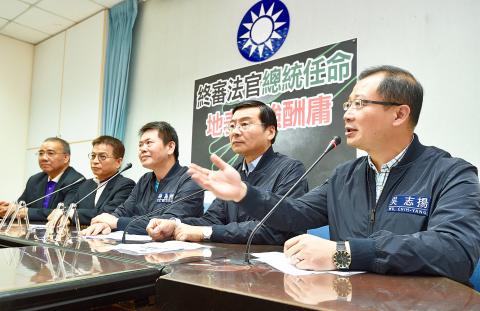Judicial Yuan officials yesterday defended a proposal to streamline the upper echelon of the judiciary, by drastically reducing the number of Supreme Court judges, while giving the president the power to appoint judges without legislative approval.
The proposed regulations would create a more equitable judicial system and help avert political interference, the officials said.
The proposal to reduce the number of judges at the highest level was presented at Monday’s meeting of a preparatory committee for the National Congress on Judicial Reform, with committee members saying that the president should have the power to appoint judges to the Supreme Court and the Supreme Administrative Court.

Photo: Peter Lo, Taipei Times
The main focus of the plan is to make the system more of a pyramid structure, cutting the numbers of Supreme Court and Supreme Administrative Court judges from a combined total of 94 to 14 and seven respectively within five years.
Under the proposal, the Judicial Yuan president would nominate 63 candidates — three times the required number of judges — before a screening committee trimmed the list to 42. The president would select candidates from the shortlist.
Judicial Yuan Secretary-General Lu Tai-lang (呂太郎) told a news conference in Taipei yesterday that although there is a perceived shift toward a situation where political appointments of Supreme Court judges could be made — a cause for concern among some people — the proposal would actually safeguard the system from political interference.
Taiwan has a similar justice system to Austria, Germany, Spain and South Korea, whose leaders appoint Supreme Court judges, with or without the approval of parliament.
“We are conforming to a worldwide trend,” Lu said.
At present, the Judicial Yuan nominates and appoints top-level judges, which has led to criticism and calls for change.
Some legal experts and judicial reform advocates say that the Judicial Yuan is not aligned with societal progress and the democratization of the past two decades, having a mindset and attitude still heavily influenced by the training they received during the Chinese Nationalist Party’s (KMT) one-party authoritarian rule.
The proposal has caused heated debate among lawmakers.
KMT caucus convener Sufin Siluko (廖國棟) said that President Tsai Ing-wei (蔡英文) is using illegal means to expand her powers, with the aim of influencing the judicial system.
“Tsai’s regime is heading toward a dictatorship. Her gradual moves to broaden her powers are the same as those conducted by Adolf Hitler,” Sufin said.
Democratic Progressive Party (DPP) Legislator Tsai Yi-yu (蔡易餘) defended the plan.
As the president would only choose from a shortlist of nominees, there would be relatively little outside influence in the process, Tsai Yi-yu said.
Grand Justice Lin Tzu-yi (林子儀), who convened Monday’s judicial reform meeting, said it is a misunderstanding to describe the proposed nomination procedure as allowing “political appointments.”
“The screening committee would be composed of legal experts, legislators and professionals from various sectors, so it would be a democratic process that ensures the courts represent the diverse voices of society,” Lin said.

A Vietnamese migrant worker on Thursday won the NT$12 million (US$383,590) jackpot on a scratch-off lottery ticket she bought from a lottery shop in Changhua County’s Puyan Township (埔鹽), Taiwan Lottery Co said yesterday. The lottery winner, who is in her 30s and married, said she would continue to work in Taiwan and send her winnings to her family in Vietnam to improve their life. More Taiwanese and migrant workers have flocked to the lottery shop on Sec 2 of Jhangshuei Road (彰水路) to share in the luck. The shop owner, surnamed Chen (陳), said that his shop has been open for just

Global bodies should stop excluding Taiwan for political reasons, President William Lai (賴清德) told Pope Francis in a letter, adding that he agrees war has no winners. The Vatican is one of only 12 countries to retain formal diplomatic ties with Taiwan, and Taipei has watched with concern efforts by Beijing and the Holy See to improve ties. In October, the Vatican and China extended an accord on the appointment of Catholic bishops in China for four years, pointing to a new level of trust between the two parties. Lai, writing to the pope in response to the pontiff’s message on Jan. 1’s

TAKE BREAKS: A woman developed cystitis by refusing to get up to use the bathroom while playing mahjong for fear of disturbing her winning streak, a doctor said People should stand up and move around often while traveling or playing mahjong during the Lunar New Year holiday, as prolonged sitting can lead to cystitis or hemorrhoids, doctors said. Yuan’s General Hospital urologist Lee Tsung-hsi (李宗熹) said that he treated a 63-year-old woman surnamed Chao (趙) who had been sitting motionless and holding off going to the bathroom, increasing her risk of bladder infection. Chao would drink beverages and not urinate for several hours while playing mahjong with friends and family, especially when she was on a winning streak, afraid that using the bathroom would ruin her luck, he said. She had

MUST REMAIN FREE: A Chinese takeover of Taiwan would lead to a global conflict, and if the nation blows up, the world’s factories would fall in a week, a minister said Taiwan is like Prague in 1938 facing Adolf Hitler; only if Taiwan remains free and democratic would the world be safe, Deputy Minister of Foreign Affairs Francois Wu (吳志中) said in an interview with Italian newspaper Corriere della Sera. The ministry on Saturday said Corriere della Sera is one of Italy’s oldest and most read newspapers, frequently covers European economic and political issues, and that Wu agreed to an interview with the paper’s senior political analyst Massimo Franco in Taipei on Jan. 3. The interview was published on Jan. 26 with the title “Taiwan like Prague in 1938 with Hitler,” the ministry